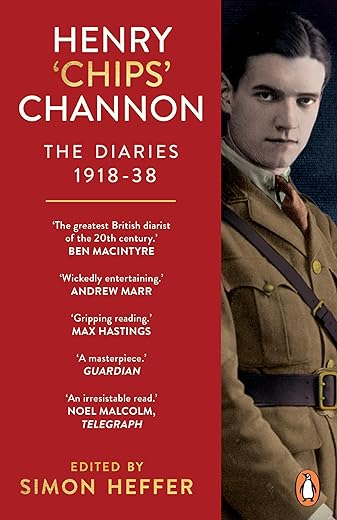Henry ‘Chips’ Channon: The Diaries (Volume 1): 1918-38
£14.71£15.99 (-8%)
The Sunday Times bestselling edition of Chips Channon’s remarkable diaries.
‘The greatest British diarist of the 20th century. An astonishing achievement. By turns frivolous and profound.’ Ben Macintyre, The Times
‘Wickedly entertaining. Genuinely shocking, and still revelatory.’ Andrew Marr, New Statesman
‘An irresistible, saucy read . . . One of the most impressive editions of our time.’ The Telegraph
‘They’re among the most glittering and enjoyable diaries ever written’ Observer
____________________________________
Born in Chicago in 1897, ‘Chips’ Channon settled in England after the Great War, married into the immensely wealthy Guinness family, and served as Conservative MP for Southend-on-Sea from 1935 until his death in 1958. His career was unremarkable. His diaries are quite the opposite.
Elegant, gossipy and bitchy by turns, they are the unfettered observations of a man who went everywhere and who knew everybody. Whether describing the antics of London society in the interwar years, or the growing scandal surrounding his close friends Edward VIII and Wallis Simpson during the abdication crisis, or the mood in the House of Commons in the lead up to the Munich crisis, his sense of drama and his eye for the telling detail are unmatched. These are diaries that bring a whole epoch vividly to life.
________________________________
‘Fascinating and sometimes a key historical record. And the man could write.’ Daily Mirror
‘Fascinating stuff.’ The Spectator
‘Gripping reading.’ The Sunday Times
‘Chips perfectly embodied the qualities vital to the task: a capacious ear for gossip, a neat turn of phrase, a waspish desire to tell all, and easy access to the highest social circles across Europe.’ Jesse Norman, Financial Times
‘A masterpiece of storytelling and character assassination.’ Guardian
Read more
Additional information
| Publisher | Penguin (21 Mar. 2024) |
|---|---|
| Language | English |
| Paperback | 896 pages |
| ISBN-10 | 1529159318 |
| ISBN-13 | 978-1529159318 |
| Dimensions | 12.7 x 4.5 x 19.69 cm |










by Jim Bowen
Political diaries became a “thing” after Alan Clarke published his diaries. They were gossipy, and vicarious, giving you an idea of what was going on at a high political level. Clarke knew he wasn’t going to be Prime Minister, but had the ear of those that might be.
The same couldn’t be about Henry ‘Chips’ Channon. These diaries are gossipy, and give you an idea of what life was like for someone of money, who was rising through British society, because of his money, charm and wit. There were two issues, i think. First, I know that hindsight is 20/20, but Channon couldn’t read Nazi ideas and judgement, with an instruction manual, and a sign hanging over them saying “This is a lie.” By 1937, he was so enamoured of Nazi ideas that he was effectively saying “Democracy isn’t for Johnny Foreigner”. Ted Heath, who became Prime Minister in the 1970s could see there were issues in pre-war Germany as a teen/20-something student, but this apparently went straight over Channon’s head entirely.
My other problem with the book was that I’m not sure that Channon was close enough to the people at the heart of power to be entirely trusted. He met with them regularly, and they liked him, but they didn’t trust him enough to give him ideas that they needed to be discreet about, or “tempered” his views. He seems to make up his mind, and then stick with it, come hell or high water. Even when he got closer to the centre of power, there was no tempering his views.
My final issue is that when I read the Clarke diaries, I knew who he was talking about pretty well, and understood why I should care about what they were talking about. My problem with these diaries is that while I was aware of the general thrust of what was going on, it would have been nice to have asides inserted into the boook, explaining why Channon was getting so worked up, That it didn’t made me wonder why I should care about certain entries, if I’m honest.
In short, if you can get over the grumbles I raised, you’ll probably enjoy the book more than I did.
by S Riaz
This first volume of Henry ‘Chips’ Channon’s diaries take the reader from 1918 to 1938. It begins with Channon in Paris during WWI and there is then a gap until 1923, when the young Chips Channon embarks on endless long weekends, attends aristocratic weddings, goes to parties, balls, horse racing and socialises as though it is his career. In many ways it was. Names here include Vanderbilts, Curzons, Astors, Cunards, the ‘Yorks,’ and the Prince of Wales. Channon was very much a part of the Prince of Wales set and, indeed, during these diaries he seems always to back the ‘wrong horse,’ which makes the reader – who has the benefit of hindsight – aware of the disappointments that often await him.
Although born in America, Channon seemed to take a deep dislike towards his home country. This is another trait he has – disliking anything from people, such as Duff Cooper, to whole countries, including France and the French and to turn on those he previously lauded. In 1924 he has to leave his, ‘adored London,’ to sail to the States; declaring leaving was, ‘like a surgical amputation.’ He passed some weeks in the USA with his parents – ‘this cauldron of horror,’ and, as he left England, ‘felt my last link with civilisation snap.’ However, Chips Channon’s extremes are what make this diary so interesting. In his diary, kept utterly private, he can unload his real feelings about people, things, and places and he certainly doesn’t hold back. One of the reasons he struggled with America, becomes clearer when he bemoans, ‘Is our American aristocracy to descend from movie stars?’ Chips was not impressed by the fledgling admiration of the upstart famous, but rather loved the royals of all countries and, in this book, we discover his lust for social climbing and acceptance by the titled, as well as his love of gossip.
When his diaries were first published, they caused outrage and shock, but now that time has passed, hopefully nobody is left to be hurt. Although the reader can see how absurd Channon’s desperate longing for social acceptance was, these diaries are really addictive, and it is easy to totally sink into the pages. The diaries take the reader through the 1920’s, although there is a jump from 1929 to 1934 when we suddenly find Chips, who has spent much of the first half of the first volume seeming to delight in male company, suddenly married to Honor Guinness, after his beloved George gets engaged to Imogen Moggs.
By 1934, Channon has decided to stand as a Member of Parliament; involving many visits to Southend (luckily, his constituents did not get so much of a glimpse of his diary and what he thought of it, or them….). We then move on to the issues of the day. His dislike of Randolph Churchill, friendship with ‘Tom’ Mosley, thoughts of Country Houses, such as Cliveden (‘Sodom on Thames’), his interest in faddish diets, Mrs Simpson, meeting Mussolini, visiting Berlin during the Olympics, seeing Hitler, having dinner with Goering and visiting a labour camp (where he was totally taken in by the ‘tidy’, hard-working young men being re-educated there), his friendship with Ribbentrop and the battle for the throne during the abdication crisis.
Even Channon, who was most definitely a supporter of Edward and Mrs Simpson, felt HRH was, ‘the most indiscreet man in all London.’ Meanwhile, the new king is described by someone at the Palace as a ‘petulant lunatic,’ and forced into abdicating by the government. Channon predicts how bored and lonely the king would be, as the Palace puts its foot down and they are isolated and abandoned. With Edward and Mrs Simpson shuffled off into exile, there is little time to spend on what quickly becomes a story of the past. Politics are moving swiftly, and Chips – pro German – is in the House of Commons as war looms. As Channon’s marriage falters, the Germans march into Austria. Chamberlain is Prime Minister and Channon gleefully pours the current political gossip into his diary. Plots and factions abound; he applauds Chamberlain, Halifax and appeasement, while it becomes obvious to most that Hitler is not to be reasoned with.
Without doubt, the Abdication Crisis and the rumblings of war are central to this volume. Even though Channon was in Paris during the first world war, the only thing he did seem to take from it was his sensible desire not to be caught up in another war. No glory, he feels, in losing a limb and you sense his wish for hostilities to start once he is too old to fight or can wangle a desk job. His love for his son, Paul, does make him more sympathetic and, however ridiculous he appears, it is difficult not to get utterly engrossed in his musings of what colour jacket should be worn to a dinner, commiserate with his humiliation at not being invited to the Court Ball – again, or snigger at his sniping of ‘socialist’ politicians, who are not quite gentlemen and dare to wear flannel trousers in the House. Absurd, yes, but Chips was writing for himself and so his rants, snobbery, obsession with royalty and social climbing, are both fascinating and humorous. It is hard not to feel sorry for him as he has doubts about his marriage, longs for another child, is humiliated when caught out taking a couple of years off his age or has to hide his corset from both a guest who insists on following him while he changes, and then from housemaids, before they discover his hiding place. Despite his faults, this is an excellent read and an interesting historical account, from someone who knew everyone of importance in those fascinating pre-war years and the lead up to WWII. The next volume, ‘Henry ‘Chips’ Channon: The Diaries (Volume 2): 1938-43’ are out in September 2021. I have already pre-ordered and cannot wait to re-enter his world.
by Rose Skinner
A naturalised American’s view of Life in London after the First World War with many anecdotes about members of the displaced Royal families of Europe